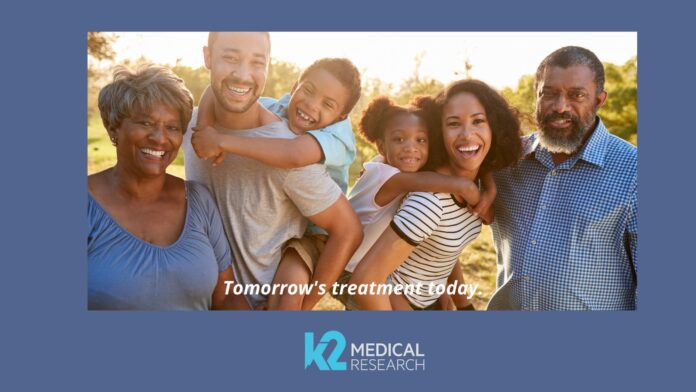ORLANDO – For the 580,000 Floridians who are living with Alzheimer’s disease, or for the state’s 1.1 million citizens who who serve as unpaid Alzheimer’s caregivers, one thing is certain: There’s no time to lose. Alzheimer’s is a progressive disease that robs people of time and memory, and the burden is growing. This is especially true for the Black community.
The risk for Alzheimer’s — which is known as a silent epidemic — disproportionately affects Black people. According to the Alzheimer’s Association, African Americans are twice as likely to develop Alzheimer’s as their white counterparts.
The good news is: Thanks to decades of scientific research, and many, many clinical trials, we are finally gaining a better understanding of Alzheimer’s. This means that we are closer than ever to better treatments and – eventually, hopefully – finding a prevention or cure. It also means we are closer than ever to helping our fellow Floridians who are impacted by the disease, too.
Right now, K2 Medical Research in Maitland is enrolling volunteers for an Alzheimer’s clinical research study that could advance understanding of the disease and increase the availability of a potential new treatment.
To make sure any new treatment works for everyone, researchers are committed to ensuring that clinical research trials are representative of the people who develop the disease.
“Representation from people of all ages, races, and minority groups is critical in drug development, particularly as drugs become close to market,” said Dr. Sheila Baez-Torres, principal investigator for the study.
Historically, a mere 2 to 6 percent of people who are Black or Latino participate in Alzheimer’s research trials. Beyond trial participation, they are also less likely to be diagnosed with the disease.
Obstacles to participating in clinical research can come down to simple barriers like cultural barriers, or transportation. A new report from the Robert Wood Johnson Foundation notes: One in five adults without access to a vehicle or public transportation reported skipping necessary healthcare services.
The researchers at K2 Medical are doing everything they can to eliminate those types of healthcare barriers by bringing resources and information about brain health into the communities they serve. This includes taking a mobile unit to underrepresented communities for memory screenings, and hiring staff with cultural diversity.
“Inclusion is important. That’s why at K2 Medical Research, we are working to recruit participants from traditionally underrepresented communities in this important study,” Dr. Baez-Torres added.
K2 Medical Research, which is a part of the Global Alzheimer’s Platform (GAP) Foundation network (GAP-Net) of research sites, is intentionally working to enroll volunteers from underrepresented communities in and around Orlando. GAP-Net sites benefit from sharing knowledge and experience to advance research about Alzheimer’s and other neurodegenerative conditions.
Research suggests that Alzheimer’s may be caused by an abnormal build-up of a protein in the brain called amyloid beta. This study will help confirm if a treatment designed to reduce amyloid beta helps people alleviate early symptoms of Alzheimer’s. If the treatment is effective, it could potentially slow cognitive decline.
Getting information about brain health is especially important now, as communities across the state celebrate Alzheimer’s and Brain Awareness Month this month. The celebration is a time when we come together to raise awareness about Alzheimer’s and other dementias, and it’s a time when we shine a bright light into the darkness of this disease.
We can’t get access to life-improving Alzheimer’s treatments without diverse clinical trials, and we cannot move research forward without people who are willing to participare in the study.
“This is a comprehensive study that provides our patients not only state of the art diagnostic tools, but also the unique chance for patients with mild cognitive impairment (MCI) and mild Alzheimer’s disease to receive treatment with a drug that is already FDA approved,” said Dr. Sheila Baez-Torres, principal investigator at K2 Medical Research. “That may change their course of cognitive decline in the affected population.”
For the study, Dr. Baez-Torres said that people who are between the ages of 65 to 80 who have mild Alzheimer’s or MCI should learn more. People who are enrolled in the study will visit the research clinic on a monthly basis and will need to enroll with a study partner, such as a family member or reliable friend.
“We are proud and excited to be part of this process, through which we are helping thousands of current and future patients that need this unparalleled support,” said Dr. Baez-Torres.
People interested in learning more can call (407) 500-5252 or visit https://k2medicalresearchform.com.







